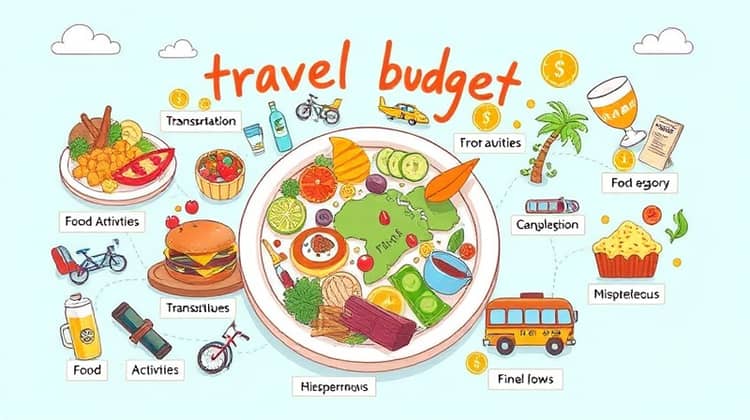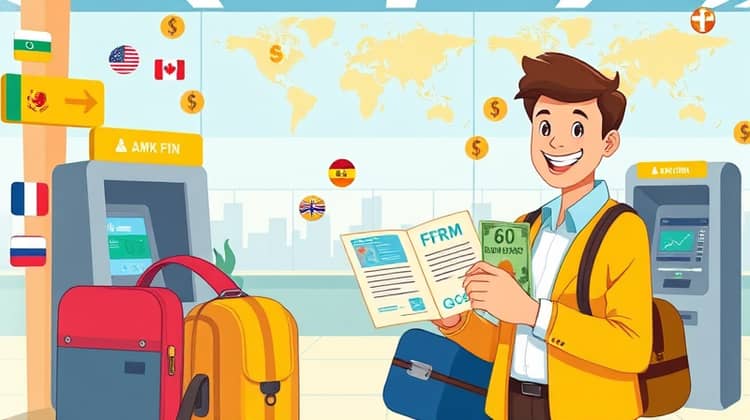Travel Budgeting: Top Tips for Effortlessly Tracking Expenses on the Go

Traveling can be thrilling, but it can also be a financial burden if not managed properly. Effectively tracking your expenses while on the go is vital for ensuring you stay within your budget and can enjoy your travels without financial stress.
In this blog post, we’ll explore some top tips for effortlessly tracking your travel expenses, so you can focus more on making memories and less on money matters.
1. Set a Realistic Budget Before You Leave

Budgeting is the cornerstone of a successful travel experience. Setting a realistic budget involves considering not only your destination but also your personal spending habits. Are you a frugal traveler content with street food, or do you prefer dining at fine restaurants? The clearer you are about your financial expectations, the more manageable your trip will be.
Before you pack your bags, outline your expenses. Consider the costs of accommodation, daily meals, transportation, attractions, and souvenirs. By doing this, you create a framework to keep you grounded financially and avoid unnecessary splurges.
- Calculate the cost of flights and accommodation
- Estimate daily meal costs by researching local prices
- Factor in transportation costs like local transport or car rentals
- Include entertainment and activity fees for attractions
Having a clearer picture of your expected expenses allows you to enjoy your trip without constantly worrying about your budget. This foresight can be the difference between a stress-free vacation and one filled with financial anxiety.
2. Use Travel-Specific Apps

In our modern world, there's an app for almost everything—and budgeting is no exception. Travel-specific budgeting apps can significantly simplify your expense management while abroad. These apps not only track your expenses but also categorize them for a more straightforward overview.
From tracking currency exchanges to noting expenses down in real-time, the right app can enhance your travel experience and reduce the likelihood of overspending. You’ll always be aware of your financial status at a glance, making it much easier to stick to your budget.
- Expensify allows you to upload receipts quickly
- Trail Wallet helps estimate daily budgets and expenses
- Wally offers a comprehensive view of all expenses by categories
- Splitwise helps manage shared expenses with friends or travel companions
By using these travel-specific apps, you streamline your budgeting process, enabling you to focus more on enjoying your trip rather than stressing over finances.
3. Break Down Your Budget

Breaking down your budget into specific categories makes it even easier to manage your spending. Instead of having a general figure for how much you can spend overall, segment that into distinct parts—such as food, activities, and transportation. This approach allows you to gauge precisely where your money is going during your travels.
For instance, if you allocate $30 a day for meals and stick closely to that amount, you’ll be less inclined to overspend on an extravagant dinner at the expense of tomorrow's adventure.
- Daily meal budget
- Attraction fees and activity costs
- Local transportation
- Miscellaneous expenses for surprises
Committing to this detailed approach can keep you accountable and help prevent overspending in one area, ensuring a balanced travel experience.
4. Keep All Receipts

Keeping receipts is a simple yet effective method for tracking your expenses accurately. Whether you prefer old-school paper receipts or digital copies through apps, maintaining a log helps you remember where your money has gone. It's especially useful in foreign countries where you may not remember how much you spent at a local eatery.
When you review your receipts before the end of your trip, it also encourages you to adjust your spending habits if one category is over-burdened.
5. Use a Travel-Friendly Bank Account

Opting for a travel-friendly bank account can make currency exchanges and spending easier when abroad. Many banks offer accounts with features such as limited transaction fees and favorable currency exchange rates that prevent unnecessary charges. You can easily withdraw cash without fear of steep ATM fees, keeping your cash flow under control.
6. Regularly Update Your Expenses

It's essential to regularly update your expense records during your travels, ideally at the end of each day. Dedicating a few minutes to log your expenses will help prevent any budget surprises and promote awareness of your spending habits, regardless of how often you check your overall budget.
This consistent review gives you the necessary information to make informed decisions as your trip progresses. If you notice you're nearing the end of your budget in one area, adjustments can be made accordingly before it’s too late.
7. Stay Flexible

Flexibility can be a game-changer when traveling. Your budget is a guideline, not a prison sentence. Unexpected opportunities or expenses will arise, and allowing yourself some flexibility leads to memorable experiences.
Plan for both positive and negative things that could happen and try to maintain an adaptable mindset. This balance between budgeting and spontaneity can provide the best of both worlds during your travels.
8. Share Expenses with Travel Companions

Traveling with companions offers an excellent opportunity to share expenses which can significantly reduce individual costs. The more you discuss your financial strategies together, the better you can explore options and even take turns paying for shared costs. This camaraderie can lead to budget-friendly outings if organized well.
9. Don’t Forget About Hidden Costs

When budgeting for a trip, it is easy to overlook hidden costs that can throw your financial plan out of sync. Additional costs could vary from service fees, tips, travel insurance, or charges for extra luggage. Even things like taxes on services or attractions can add up, so consider these when you set your budget.
To keep your finances in check, it’s wise to account for potential hidden expenses that could arise throughout your travels. Acknowledge these possibilities in your budget to minimize surprises.
- Service fees for activities and excursions
- Tips for guides or servers
- Travel insurance charges
- Currency exchange fees
Not factoring in these hidden costs can result in underestimating your budget, which may lead to uncomfortable financial situations later in your trip.
10. Review Your Budget Post-Trip

After your travels, reviewing your budget can yield essential insights for future trips. Take some time to analyze your expenses and determine areas where you remained compliant or deviated. This analysis sheds light on your spending trends and habits.
Identifying successful strategies and those that fell short can inform more efficient budgeting methods for your next adventure.
In Conclusion

Tracking your travel expenses does require dedication and planning, but the benefits are undeniable. With the right strategies in place, budgeting can become a seamless aspect of your travel experience rather than a burdensome task.
Taking the time to manage your finances effectively will ensure you can make the most of your trips – both financially and in terms of enjoyment.






